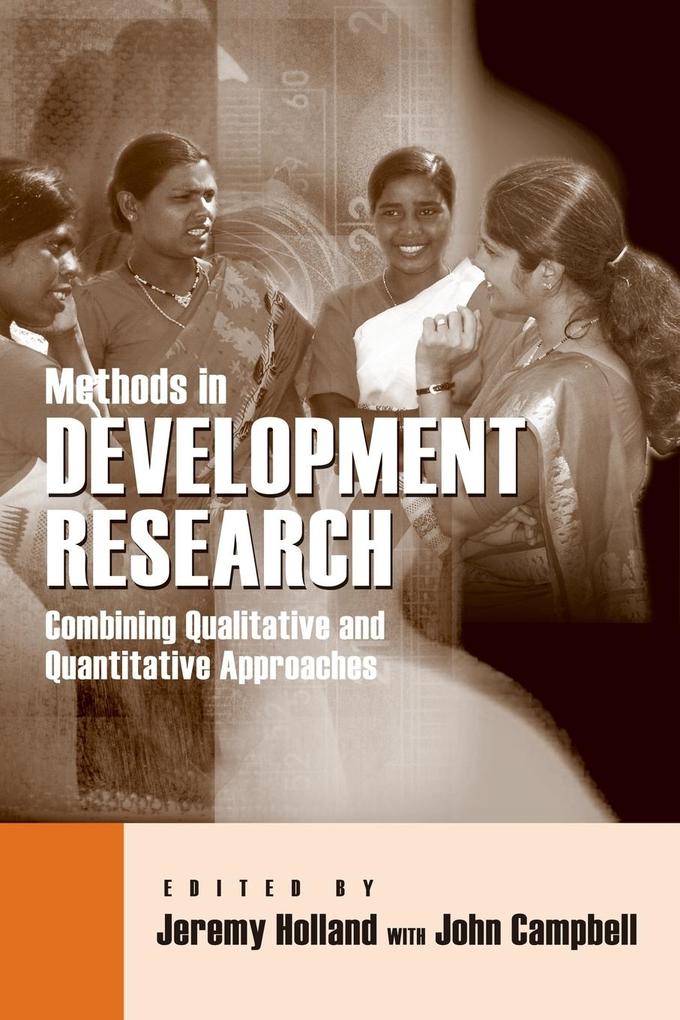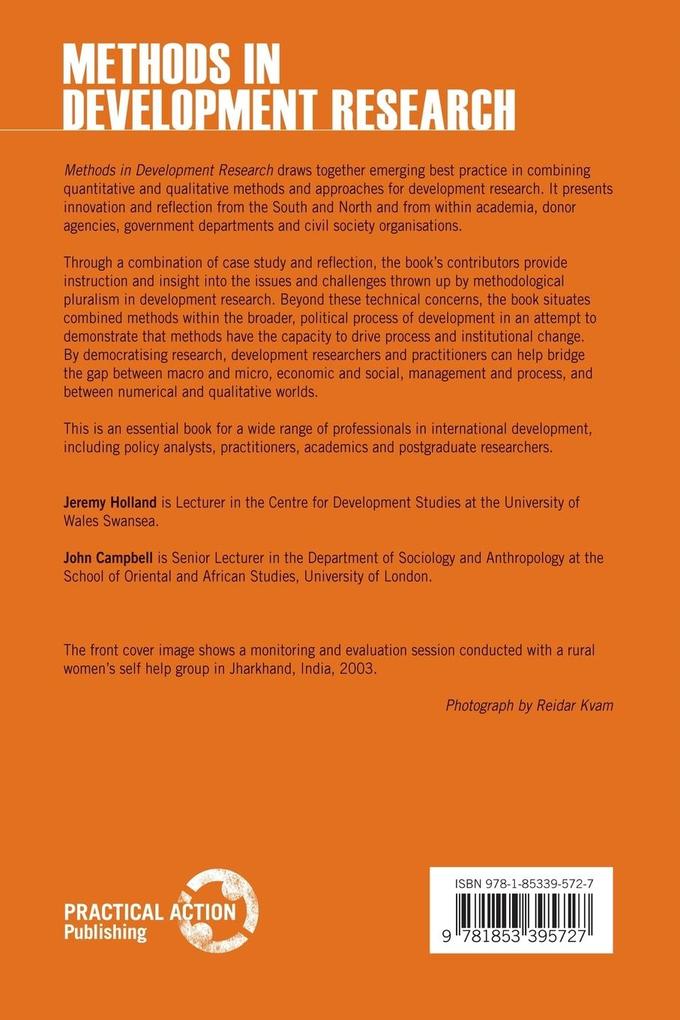
Zustellung: Mo, 28.07. - Fr, 01.08.
Versand in 2 Wochen
VersandkostenfreiBestellen & in Filiale abholen:
This book situates current development research issues squarely within debates about development policy and social research and it will help begin the process of defining best practice in the use of participatory/ qualitative and quantitative methods of considerable interest to academics, practitioners and policy makers.
Inhaltsverzeichnis
1 General Introduction: Context and challenges for combining methods in development research JEREMY HOLLAND AND JOHN CAMPBELL. PART I: Combining forces with qualitative and quantitative research. 2 Introduction: Bridges and fences for combined methods JEREMY HOLLAND AND JOHN CAMPBELL. 3 Little white pebbles: Getting the research questions right and getting the right data MIKE JENNINGS. 4 Some practical sampling procedures for development research IAN WILSON. 5 Impact assessment of microfinance: Towards a new protocol for collection and analysis of qualitative data JAMES COPESTAKE, SUSAN JOHNSON AND KATIE WRIGHT. 6 What determines successful sustainable development projects? Some evidence from the PRODERS experience in Mexico GIL YARON, JUTTA BLAUERT AND ALEJANDRO SANGUINES. 7 Combining qualitative and quantitative methods in evaluation- related rural-tourism development research JENNIFER BRIEDENHANN AND EUGENIA WICKENS. PART II: Quantifying the qualitative in development research. 8 Introduction: Reflections on Quantification JEREMY HOLLAND AND JOHN CAMPBELL. 9 Quantitative analysis approaches to qualitative data: Why, when and how? SAVITRI ABEYASEKERA. 10 What do you sense? Applying analytical sensory evaluation techniques to research on development issues QUIRIEN VAN OIRSCHOT AND KEITH TOMLINS. 11 Strong fences make good neighbours: Survey and participatory appraisal methods in poverty assessment and PRS monitoring SIMON APPLETON AND DAVID BOOTH. PART III: The process of combination: Democratizing research, empowerment and institutional change. 12 Introduction: Combined research as process JEREMY HOLLAND AND JOHN CAMPBELL. 13 Quality, quantity and the third way NIGEL GILBERT. 14 The Peer Ethnographic Method for health research: Methodological and theoretical reflections NEIL PRICE AND KIRSTAN HAWKINS. 15 Participatory indicator development for sustainable natural resource Management ANDREW DOUGILL AND MARK REED. 16 Exploring the Temporal Logic Model: A Colombian case study evaluating assistance to internally displaced people ANDREA LAMPIS. 17 Trade-offs between management costs and research benefits: Lessons from the forest and the farm KATHRIN SCHRECKENBERG, ADRIAN BARRANCE, ANN DEGRANDE, JAMIE GORDON, ROGER LEAKEY, ELAINE MARSHALL, ADRIAN NEWTON AND ZAC TCHOUNDJEU. 18 Evaluating democracy assistance: The inadequacy of numbers and the promise of participation GORDON CRAWFORD. 19 Monitoring Social Policy Outcomes in Jamaica: Combined methods, democratic research and institutional change JEREMY HOLLAND, JENNY JONES, STEADMAN NOBLE, ANDY NORTON AND KEN SIGRIST. 20 From development research to policy change: Research capacity building in developing and transitioning countries TANJA BASTIA, ELEANOR FISHER, JEREMY HOLLAND AND DUNCAN HOLTOM. Glossary of Meanings; Notes; References and sources; Index.
Produktdetails
Erscheinungsdatum
15. Dezember 2005
Sprache
englisch
Seitenanzahl
304
Herausgegeben von
Jeremy Holland, John Campbell
Verlag/Hersteller
Produktart
kartoniert
Gewicht
544 g
Größe (L/B/H)
231/155/18 mm
ISBN
9781853395727
Entdecken Sie mehr
Bewertungen
0 Bewertungen
Es wurden noch keine Bewertungen abgegeben. Schreiben Sie die erste Bewertung zu "Methods in Development Research" und helfen Sie damit anderen bei der Kaufentscheidung.










